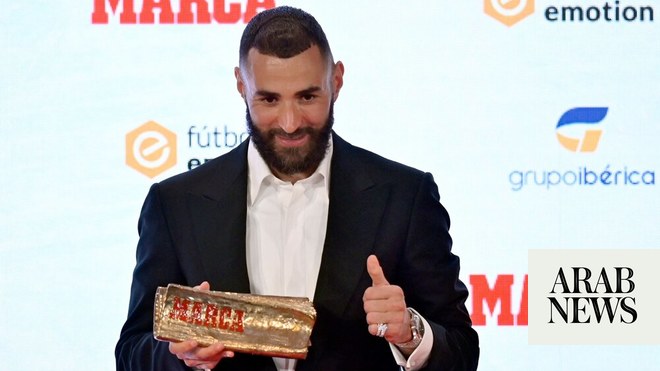
In Spain, Zinedine Zidane has been dismissed by some as a “clap clap” coach, somebody who does little more than stand in the technical area banging his hands together in encouragement, while letting the players get on with it.
Real Madrid win not because they stymie the opposition, but because they have so many good players that eventually one does something to win the game.
KIEV: Tonight Zinedine Zidane could become the first manager to win the Champions League three times in a row. Only Bob Paisley has ever won three before. That suggests the Real Madrid manager is one of the greatest ever — yet nobody truly believes that. The general view, in fact, seems to be one of confusion. What is it, exactly, that Zidane does?
In Spain, he has been dismissed by some as a “clap clap” coach, somebody who does little more than stand in the technical area banging his hands together in encouragement, while letting the players get on with it. That is not entirely fair, given that at various stages Zidane has left out Gareth Bale, Isco and Karim Benzema; persuaded Cristiano Ronaldo to spare his body by playing less often; and changed the course of games with astute substitutions.
But at the same time, Zidane lacks an obvious style in the manner of most modern coaches and, more troublingly, his teams often struggle to control games. They win not because they stymie the opposition, but because they have so many good players that eventually one does something to win the game. That has proved enough to bring success in the Champions League, but Real Madrid’s recent league record is dismal: For the richest club in the world to have won only two league titles in the past decade suggests something badly awry. Last season they won the league on the back of a string of unlikely comebacks; this season, the concession of 44 goals, more than Getafe and Espanyol, could not be overcome.
But that also says something about the modern Champions League. Over the past nine seasons, more than half the available slots in the competition’s semifinals have been occupied by three clubs: Madrid, Barcelona and Bayern. Wealth takes teams a long way. Certain clubs are all but certain to qualify and, having done so, are then all but certain to make it through the group stage. Jeopardy then comes with the last 16 draw, but frequently a super-club can breeze through to the quarterfinals without being tested at all.
FASTFACTS
Marcelo vs Mohamed Salah
Marcelo might be one of the world’s great attacking full-backs, but he is not particularly disciplined when it comes to the defensive side of his job. That should offer opportunities for Salah, the Premier League’s top scorer, to get behind him. But the situation on the flank is more complicated than that. Against Roma in the semifinal second leg, Jurgen Klopp left Salah high up the pitch as Aleksandr Kolarov pushed forward from left-back. That meant Salah repeatedly found space, but also that Trent Alexander-Arnold was at times left exposed against the twin assault of Kolarov and Stephan El-Shaarawy, with Georgino Wijnaldum struggling to get across to cover from the right side of midfield. Klopp, presumably, will not risk something so cavalier here and Salah will track Marcelo at least to an extent — though if Madrid operate a 4-3-1-2, as seems likely, the direct pressure on Alexander-Arnold will be less intense.
And once a team is in the last eight, unless there is an outstanding side, the Champions League can feel like a game of pass the parcel. As Chelsea discovered in 2012, this competition is less about prolonged brilliance and more about simply being a good cup side and having a bit of luck.
Madrid’s success is probably down to a little more than that, fortunate as they were with the draw two years ago, but it does suggest a devaluing of what is supposed to be Europe’s premier competition. Or perhaps, more accurately, a repackaging: The Champions League has become what the FA Cup used to be, glamorous and exciting, a gripping drama and a creator of heroes — but not necessarily a way to determine who is best.
What Madrid have achieved — and it is something the club also did in the late 1950s when they won five European Cups in a row while winning la Liga only twice — is to find a way of peaking in the latter stages of the Champions League, so their players produce their best form when it matters.
In that sense, Zidane’s greatest gift is less the application of any sort of intensity or tactical rigor than simply his ability to coax superb performances out of fine set of players. His closest recent forebear, perhaps, is Carlo Ancelotti.
Such haphazardness and lack of planning, though, seem to run counter to the modern age. How long can you keep on winning just because your players are better than the opposition?
Tonight, we will find out.
DECODER
PREDICTION
Few major games have been so hard to predict. It is not just that either side could win, but that either could win by a large margin. All that can be said with any confidence is that there are likely to be goals.












